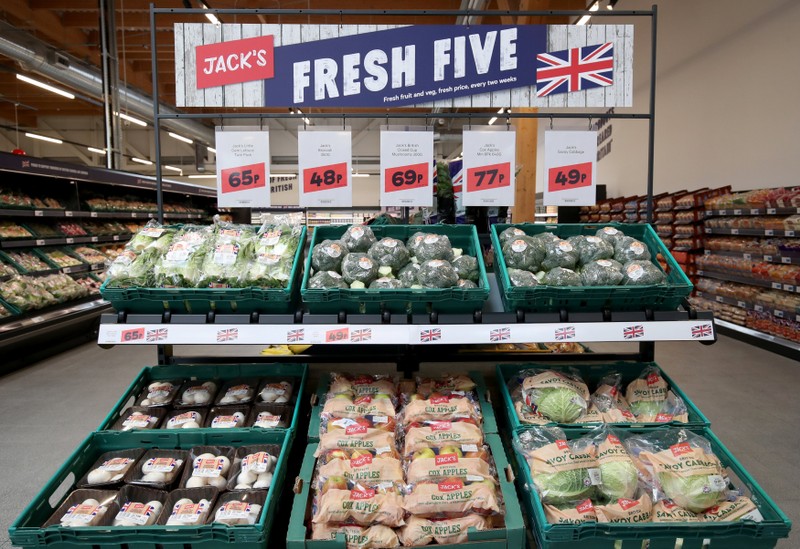
Products are displayed at Tesco’s new discount supermarket Jack’s, in Chatteris, Britain, September 19, 2018. REUTERS/Chris Radburn
September 19, 2018
By James Davey
CHATTERIS, England (Reuters) – British supermarket group Tesco <TSCO.L> laid down the gauntlet to German discounters Aldi and Lidl by launching what it said would be the cheapest store in town.
CEO Dave Lewis unveiled Tesco’s new Jack’s chain on Wednesday, saying the discount stores would sell 2,600 products including 1,800 Jack’s-branded items.
The first two Jack’s stores will open to shoppers on Thursday, with another 10-15 following in the next six months as Tesco copies the tactics of the German discounters, whose limited-range stores have won over increasing numbers of British shoppers since the economic crisis hit in 2008.
Together Aldi and Lidl now have a combined 13.1 percent market share in Britain, chipping away at market leader Tesco and its three biggest rivals Sainsbury’s <SBRY.L>, Asda <WMT.N> and Morrisons <MRW.L>.
Jack’s is named after Jack Cohen, who in 1919 founded the business that became Tesco, and is a significant move by Lewis, who has rebuilt Tesco after a 2014 accounting scandal capped a dramatic downturn in trading.
The first two Jack’s stores are located in Chatteris and Immingham, both in eastern England, and media reports have said that up to 60 existing outlets could be converted.
Lewis, however, said there were no plans beyond the first wave, although it had the option to open more.
“The intention is for us to be cheapest in town,” he said at the Chatteris store, which was built as a Tesco supermarket, but was mothballed in 2015 when the group was in crisis.
In addition to Jack’s products, the stores will stock some familiar grocery brands and a range of general merchandise on a “When it’s Gone, It’s Gone” basis, Tesco said.
It said that eight out of 10 of the products on the shelves would come from Britain and said it was investing 20 million pounds-30 million pounds ($26 million-$39 million) in the first openings.
The retailer said Jack’s stores would be a mixture of entirely new sites, sites adjacent to existing stores and a small number of converted Tesco stores.
A second mothballed store would become a Jack’s, it said, while five existing Tesco shops would be changed to the format.
TESCO FIGHTBACK
Tesco is Britain’s biggest chain with a 27.4 percent share, according to the latest industry data, although it could be overtaken by Sainsbury’s proposed 7.3 billion pound takeover of Asda.
The tie-up between Tesco’s two nearest competitors, which regulators on Wednesday said would be scrutinized in depth, is also driven, at least in part, by the rise of the discounters.
Britain’s “big four” grocers are trying to adapt to changing habits, including the declining popularity of big weekly shops and the growth of online shopping.
They have lowered prices and improved service, but analysts say that with Aldi and Lidl growing at 10 percent each year it makes sense for Tesco to try to capture some of that growth.
However, some are concerned Tesco’s new format could simply cannibalize sales at its existing stores.
Jack’s is not the first attempt by Britain’s mainstream grocers to crack the discounter market.
Sainsbury’s joined up with Denmark’s Dansk Supermarked in 2014 to bring the Netto discount brand back to Britain but closed its 16 stores two years later, blaming the difficulty and cost of growing at pace and scale.
Tesco attempted to go down the discount route in the 1980s, with its Victor Value brand. It ditched the concept. Asda has also experimented.
“It won’t be easy to crack the discount market though, even for a brand of Tesco’s size,” said Gordons law firm partner and head of retail Andy Brian.
“It goes without saying, but Tesco will have to find a way to attract customers from the likes of Aldi, Lidl and Iceland, rather than convert existing Tesco customers into discount shoppers through brand association.”
($1 = 0.7616 pounds)
(Reporting by James Davey, Writing by Sarah Young and Paul Sandle; Editing by Alexander Smith and Susan Fenton)

